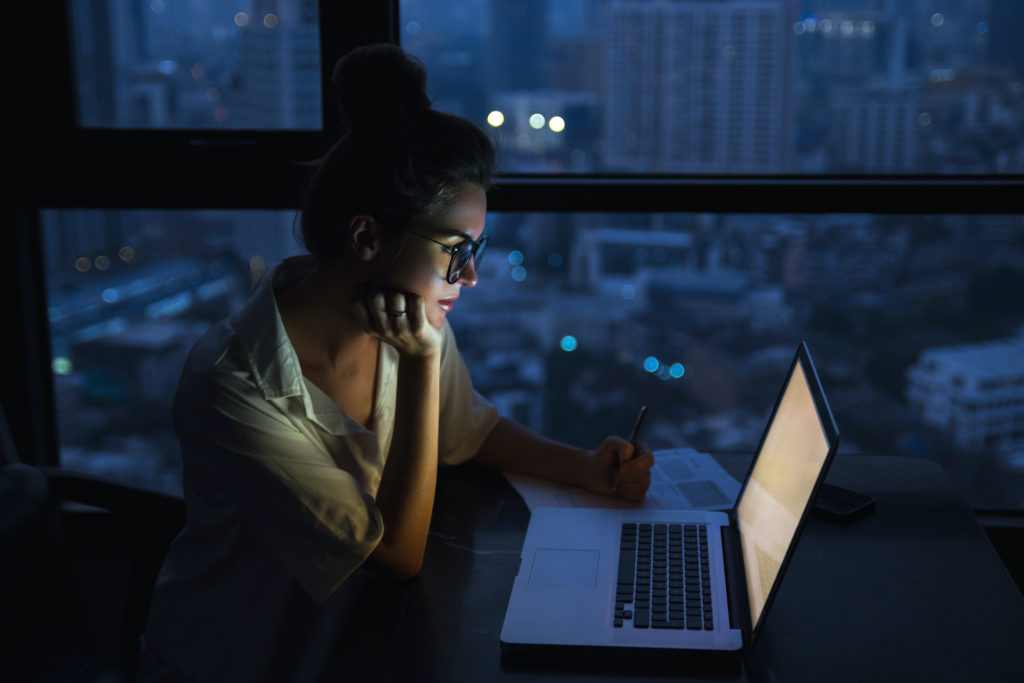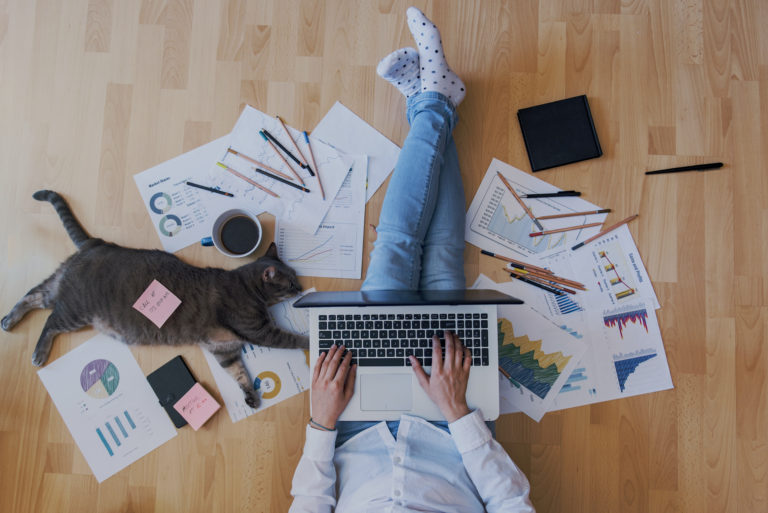This post contains affiliate links. If you use the links to make a purchase, I may receive a small commission, at no additional cost to you. Thank you for your support. You can read my full disclosure here.
I recently posted about all the advantages of getting to stay at home more. But many of us are also now working from home full-time and wondering how in the world we’re supposed to do so effectively with young children, pets, and home schooling all going on at the same time. A constant stream of interruption. Between food breaks, technology issues, phone calls, and chasing creatures (four-legged or two) down to stop them from doing something they shouldn’t do, it’s going to be impossible to get your job done. Right?
Actually, probably not.
Research from back in 2013 demonstrated that the average office worker was productive for less than 3 hours per day. At the time, scrolling through social media and news pages were the primary time-wasters. If that was already reducing productivity in 2013, I’d be willing to bet that it’s only gotten worse since then as social media has become even more prevalent. But for the sake of argument let’s say that you’re still being productive for a full three hours of the time you spend at the office. The rest of the time is a constant stream of interruption. Food breaks, technology issues, phone calls, chasing people down to stop them from doing something they shouldn’t do. . .wait.
Do you see where I’m going with this?

Food breaks involve two kids needing snacks instead of you wandering down to the vending machine with Karen. Tech issues mean Zoom crashes on your kid’s first day of class instead of not being able to access your VPN. Instead of chasing down the business development director who is about to give away the farm, you’re chasing the new puppy who has gotten hold of your Aquazurra heels.
Personally, I’d rather be chasing the puppy.
It’s all about perspective and many of us aren’t used to blending our work lives and our home lives. Changing the way we think about our day jobs, and how we approach them, is key.
All of that being said, I still have discovered a few things about working from home that crept up on me and made things harder than they had to be. Once I corrected these, things started to improve.

When working from home it’s very easy to open your laptop, check and email, review a document, or take a meeting after the time you typically would have left the office.
I noticed my work obligations creeping into my evenings, sometimes as late as two hours after the time I typically would have left the office. I felt obligated. I was already in the comfort of my own home so it didn’t initially feel the same as staying late at the office. And it wasn’t keeping me from anything important on most evenings.
Add that to the fact that, like most people, I only really had about three hours of focused work time to take care of that day, and I felt like I had no real reason to decline that meeting at 5:30pm or ignore that 6pm phone call.
But then I realized, I absolutely would have declined a late meeting or ignored an after-hours phone call if I was still working at the office. Even if work flow had been slow or non-existent that day. So, if I wanted to stay sane, I needed to do the same while working from home.
I steered back to blocking off my calendar so that everyone knew what my working hours were. When it’s quitting time, I log off, close my laptop, and walk away for the evening.
Know what you do and don’t need to be mentally checked in for, and don’t overlap them.
Once I designated my working hours, I still knew that I could walk away from my computer and focus on other things after my morning check-in. I got into the habit of working out in the mornings about an hour after my work day started.
At first this seemed like a good plan. I could log in to answer e-mails and check my calendar for the day, then step away to workout, shower, and get some breakfast.
The thing is, I never would have done that at the office. It made it so that I wasn’t mentally checking in for the day until a few hours after my work day started. Even on days when I would go to the office, check those emails, and then have nothing to do for another hour or two, I was mentally present and ready to do office things. Waiting until much later to get my head in the game made my mornings much more stressful. And I was far less inclined to actually sit down and do work once my head was off and running on other things.

You still have to mentally check in, even if physically you don’t.
To fix this, I went back to getting my exercise in either before work, over lunch, or in the evenings. I shower and have breakfast before logging in for the day, and I wait to exercise until I can actually devote my full attention to my body.
On the other hand, things like vacuuming, changing the bed sheets, and folding a load of laundry aren’t mentally taxing activities. They also don’t take an hour or more of devoted attention. Likewise, all those snack breaks and creature-chasing episodes. As these smaller tasks (distractions) pop up throughout the day, I’m able to knock them out easily. And they’re much more productive than chatting around the vending machine.
This seems counterintuitive and is a luxury many of us can’t afford. My best advice is to pick a location in your home that you don’t already use in a dedicated manner to any one particular thing. When I first started working from home I used my home office. But as the months wore on I felt disinclined to be in my office at all after working hours.
This was devastating because I’d previously used that space to film my YouTube videos, write my blog posts, do all my editing, and it also doubled as a dressing room. But when my makeup vanity became a full-time office desk, and the energy in the room was tainted by all the frustration and angst I experience during my day job, I had absolutely no desire to log off for the night and set up my camera in the same space.
What once was my creative space had been overtaken by the daily grind. My content creation suffered. My mentality around hobbies and side hustles changed. And I started to resent my day job more than I already did.

Once I realized this was happening, I looked around for somewhere else to set up shop to work from home. Our formal dining room is massively underutilized and I didn’t already associate it with anything special. Within a couple of days of moving my work space out of my personal office and into the dining room, my creative energy came surging back. I found myself spending early morning hours over coffee up in my office, blogging away again. And the dining room is a much more central location in the house than my office is, so spending most of my daytime hours in there makes it a lot easier to bounce back and forth between working and getting some of those menial tasks around the house done in between meetings.
Find a place to set up camp that doesn’t already have special meaning to you for something else. Don’t put a work table next to your knitting chair. Stay away from working in bed. Worst case scenario, get into the habit of shutting down and putting away your work computer and work-related paraphernalia every night so it doesn’t take over the space you’re using it in.
This seems silly but honestly will make you feel a million times better. Most people hate to be on camera. My co-workers almost universally default to turning off the camera during Microsoft Teams meetings. But virtual facetime goes a long way toward making sure you’re mentally checked in to the conversation, and encourages you to actually put yourself together in the mornings so you start work like it’s an actual work day.
Here are some basics:
Every single one of us has bitched about what a waste of time commuting is. Or meetings. Or being stuck sitting at the office when there’s nothing to do for two hours at a time. You finally have the opportunity to do something with all that time you used to wish you had. Remember that and don’t get stuck in a slump. Don’t start wasting time wandering from room to room, triple checking the pantry for snacks you know aren’t in there. Do you now have an extra half hour every morning an evening when you used to be driving? Read a book. Listen to a podcast. Get a workout in. Play with your kids or take the dog for an extra walk.
What did you always want to spend that time doing?